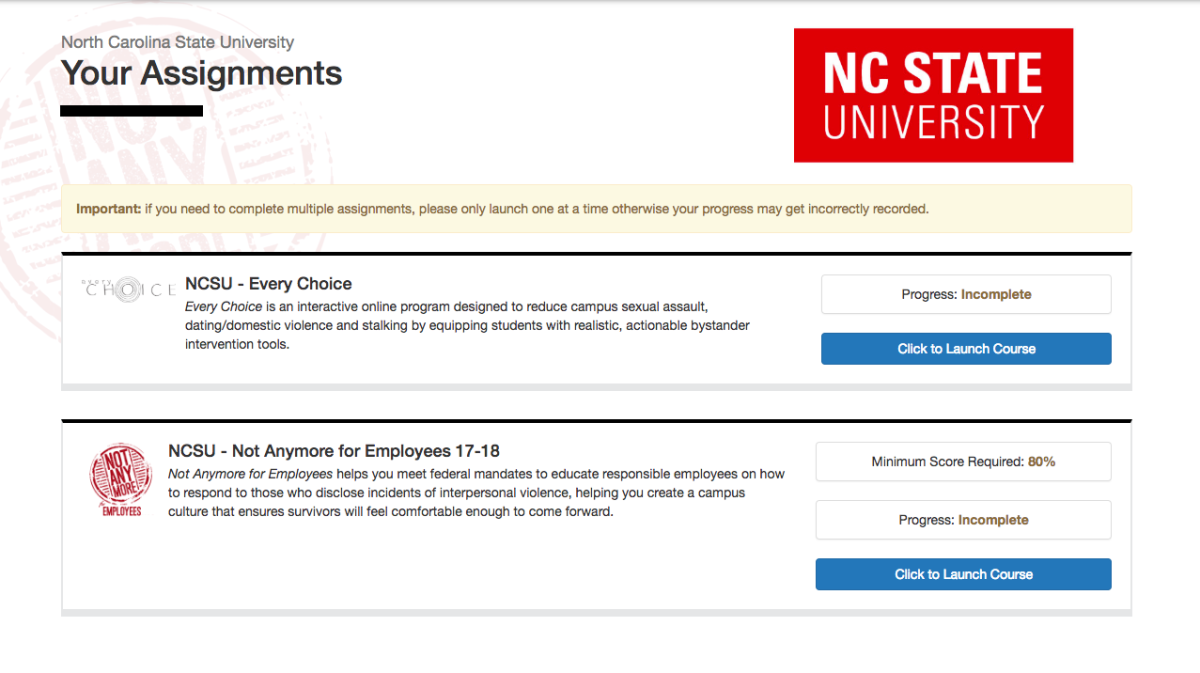As of this academic year, all new incoming students, including first-years and transfers, are required to take a new online training that educates them about the dangers and warning signs of sexual assault on campus.
The Sexual Assault Prevention Education online training is meant to teach incoming students about the key topics surrounding sexual assault, according to Sheri Schwab, the interim vice provost of the Office of Institutional Equity and Diversity.
“The online content is really around understanding several of the concepts and definitions around sexual assault,” Schwab said. “Understanding what is domestic violence or relationship violence, stalking, and certainly rape or sexual assault. So, people getting that first understanding of, what do we mean when we are talking about these things and understanding concepts such as consent.”
The Sexual Assault Prevention Education training not only gives students the tools to understand what these issues might look like in a college setting, but also discusses steps to take and on-campus resources such as the NC State University Police Department, the Women’s Center and Counseling Center.
“The other things they learn in the training is around who their resources are if that happens to them or happens to someone they know,” Schwab said. “Where on campus can they go, what’s the immediate thing that they need to do, who are people who can help you?”
According to Lisa Zapata, senior associate vice chancellor in the Division of Academic and Student Affairs, the training was created for multiple reasons beyond education.
“The goal is to educate,” Zapata said. “Our goal is to have a safe campus and our students are comfortable and healthy and able to thrive here in this environment.”
Through the sexual assault training, Schwab and Zapata hope to see an increase of student awareness, through actions such as bystander intervention or increased reporting to OIED.
“With the sexual assault prevention, awareness is our indicator,” Schwab said. “We have a system where if someone wants to make a complaint or something known, it goes into a confidential report … Will we ever prevent all sexual assaults? Unfortunately, no. But what we can have is sort of this people know they can come forward, they know what to come forward about, they understand that there are resources for them, that’s what we hope to do.”
First-year and transfer students are also required to take Alcohol-Wise Education training and Hazing Prevention training as they enter into their first year on campus. The Hazing Prevention training was introduced this year after a trial run last academic year with certain organizations on campus.
“For years, probably more than a decade, we’ve been providing alcohol education,” Zapata said. “We’ve been doing that for a really long time and in addition to the sexual assault education, we added hazing prevention education. That’s something new that we’ve done this year too. We piloted that last year with our fraternities and sororities, marching band, ROTC, club sports, athletics. It was really successful … As an institution we felt like we had to do everything we could to prevent tragedy on our campus.”
Schwab said a goal of all the trainings is to redefine “normative” behaviors students could potentially face during their time on campus.
“One of the things that I think all three trainings do, hopefully really well, is kind of breaking down what people think is normative behavior,” Schwab said. “… These awareness trainings say ‘here are resources and tools and skills that you can build when that happens, and it actually isn’t normative behavior.’”
All three trainings have been made mandatory for new students to complete by the time they come to campus because of the impact college life and a new environment can have on them.
“Again, it’s such a huge transition for them,” Schwab said. “But really these first few months, these first few weeks, that six to eight-week period coming in, is where everyone is trying out new things.”
According to Schwab and Zapata, first-year students should have completed the trainings by now, as the original deadline was Aug. 10. If trainings are not completed, it could cause students to have a hold on their MyPack Portal account during class registration.
“It could have an impact on registration for the spring semester,” Zapata said. “That’s just because we feel that it’s so important to get this information because it benefits the entire campus community.”
More information about the trainings can be found here.








